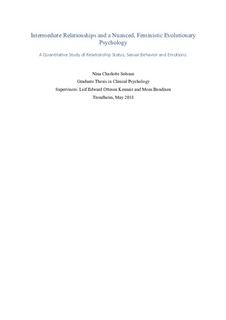Intermediate Relationships and a Nuanced, Feministic Evolutionary Psychology - A Quantitative Study of Relationship Status, Sexual Behavior and Emotions
Master thesis
Permanent lenke
http://hdl.handle.net/11250/2571153Utgivelsesdato
2018Metadata
Vis full innførselSamlinger
- Institutt for psykologi [3140]
Sammendrag
Many studies in evolutionary psychology (EP) make a major distinction between short-term vs. long-term relationship status. The current study suggests that relationships with low commitment and intermediate duration are frequent. There is reason to assume that; sexual strategies theory predicts that there will be sex differences in satisfaction depending on relationship status, where men in general are more satisfied with opportunities for short-term mating than women are. Possibly women in intermediate relationships are less satisfied due to low commitment from partners. Third wave feminism predicts that women in intermediate relationships will be more or equally satisfied than men, due to possible exploration of sexuality with greater safety than short-term allows. Participants (N=529) answered questions regarding relationship status, satisfaction and excitement, commitment and quality, and expectancies and sexual behavior. Sample were Norwegian students. 10% of the respondents belonged in the intermediate group. The results are inconsistent with both theoretical approaches. Both sexes are more satisfied in long-term relationships than short-term. There are no sex differences among singles, inconsistent with both perspectives. There were no sex differences in the intermediate group. The intermediates had the same levels of satisfaction as the singles, while excitement was similar to those in relationships. The implications of the findings in relation to both evolutionary psychology and third wave feminism, as well as implications for further research on sexual behavior, are discussed.
